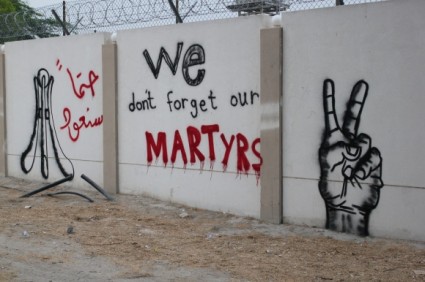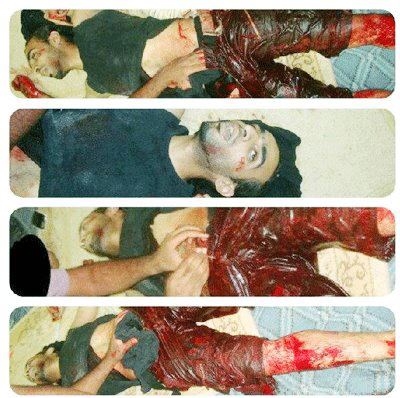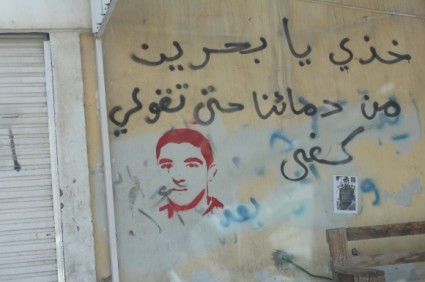“We are going to carry on protesting …” says Zainab Alkhawaja, “It doesn’t matter if we get arrested five, six, 10 times…”
Nabell Rajab, the president of the Bahrain Center for Human Rights, was released on bail after being held for nearly a month. “We always thought that America and Bahrain’s good relations would benefit our fight for freedom and democracy in our region, but it has turned out to be opposite,” he says. “They are supporting a dictator here, the oppressive regime… We have to suffer for being a rich region.”
Alkhawaja, who was jailed in April after protesting the detention of her father, Abdulhadi, vows: “We are going to carry on protesting … It doesn’t matter if we get arrested five, six, 10 times, it’s not going to stop. In the end, we have sacrificed a lot for democracy and freedom.”
June 1, 2012 No Comments
Even the walls remember the Matyrs in Bahrain
June 1, 2012 No Comments
Martyr Ahmed Ismail Hassan Remembered
June 1, 2012 No Comments
The blood shed hastens your demise Hamad
June 1, 2012 No Comments
March in Manama
June 1, 2012 No Comments
Killed in detention Rahdi Mahfoodh, 25 Years – 15 year old Raped by Police, Courts of Injustice and Prisoner Protests
Bahrain: New martyr as leaders boycott political trials
Bahrain Freedom Movement -1 June, 2012
A young Bahraini youth has been martyred after being hit by police vehicle a few weeks ago. Mohammad Rahdi Mahfoodh, 25, died as a result especially with the lack of care he had received at a hospital run by the military.
The martyr who is from Saar Town, received horrible injuries but the police did not notify his family until the following day. No details have yet emerged about the period he had remained at the scene before being taken to hospital. His funeral, attended by many people, was attacked viciously by the mercenary forces employed by the Al Khalifa.
Hassan Salman, father of fifteen year old Mohammed, has stated that his son was raped by police forces during his abduction and torture. The family from Jum’a have been left devastated by the ordeal that Mohammed described to them during his arrest. The government-employed torturers repeatedly raped him and threatened that if he did not sign a confession to the crimes that had been attributed to him, they would capture him again and torture him this time until death. The fifteen year old therefore submitted to the accusations made towards him in front of the prosecution out of immense fear for his life. Mohammed’s parents have confirmed the rape of their son who has been suffering severe pain and bleeding since his arrest by security forces.
The leaders of the revolution were taken to a “civilian” court one year after a “military” court sentenced them to life imprisonment for calling for change of regime and government. The thirteen men (out of 21 considered to be the leadership of the revolution) had been mercilessly treated after their arrest and during their earlier trial. On Tuesday 21st May the first session was held at the court which was presided by an Alkhalifa culprit who acted as the judge and the enemy of the accused. At that session Mr Abdul Wahab Hussain and Abdul Hadi Al Khawaja took turn to speak, presenting an accurate account of the horrific treatment they had been subjected to during their incarceration at the Alkhalifa dungeons. Their testimonies would dwarf the crimes attributed to Charles Taylor, the former President of Sierra Leone who has recently been sentenced to 50 years jail at the International Criminal Court. At the second session on Tuesday 28th May, the “civilian court” was addressed by Mr Hassan Mushaima and Dr Abdul Jalil Al Singace who also presented damning account of their ordeal. As soon as they completed their testimonies, they left the court and vowed not to return. They would rather be sentenced in absentia as the verdicts and sentences are a political decision by the dictator and his clique, supported by the United States.
The release of Nabeel Rajab and Zainab Al Khawaja from their incarceration at Alkhalifa dungeons marked one of the biggest blows to the pride of the ruling clique who have been condemned worldwide for arresting the four most senior human rights activist in the country. Both had challenged the torturers while in prison, urged the people outside to continue their peaceful protests and refused to abide by the rules of the torturers. They fought a war of wills; achieving victory against the Alkhalifa torturers.
Meanwhile Abdul Hadi Al Khawaja has ended his hunger strike after succeeding in drawing the attention of the world to the plight of Bahraini political prisoners and forcing the U-turn on the military trials conducted by the regime last year. …more
June 1, 2012 No Comments
Bahrain free speech and reform – Prison for participating in “hateful”, “chants, “slogans”,
Bahrain puts doctors on trial
Joshua Colangelo-Bryan – 1 June, 2012 – Global Post
Hassan Mushaima, another opposition leader given a life term, had advocated “marches, demonstrations and civil disobedience” to call for the “establishment of a democratic republic,” according to the verdict. The court sentenced Ali Abduleman, a prominent blogger, to five years in prison (in absentia) even though its verdict did not cite a single piece of evidence against him.
The special military courts also convicted 20 doctors and medical personnel of transparently political offenses, such as joining in “slogans and chants” that expressed “hatred and contempt for the governing regime.” Nada Dhaif, an oral surgeon, was sentenced to 15 years because she participated in a sit-in, took part in an International Women’s Day march, and assisted with a medical tent that treated protesters. Deya Ja’far, a nurse, was convicted in part because she allegedly stepped on a photograph of Bahrain’s prime minister. And the court convicted Fatima Haji, a rheumatologist, for allegedly asking Manchester United’s manager to observe a moment’s silence before a match.
Last June, after intense international criticism of the government’s general crackdown on protesters, the king appointed the Bahrain Independent Commission of Inquiry, consisting of five international human rights experts. On Nov. 23, the commission issued a 489-page report, which concluded that authorities had committed systematic human rights violations. The commission also called for judicial review of military court verdicts, which, the commissioners explained, meant that the government should free those convicted for peacefully exercising internationally recognized rights. …more
June 1, 2012 No Comments
In Bahrain, life in prison just for protesting
Commentary: Among the ridiculous crimes in the US ally: doctors jailed for chanting slogans, a nurse convicted for stepping on the prime minister’s photo.
In Bahrain, life in prison just for protesting
Joshua Colangelo-Bryan – 31 May, 2012 – Global Post
NEW YORK — “Of course we have free speech in Bahrain,” the official told me. “But you cannot ask to change the government — that’s a crime.” While it was striking to hear a government representative speak so candidly, it wasn’t exactly news.
Having extensively researched criminal trials in Bahrain, the island nation off Saudi Arabia’s coast, I knew this perverse understanding of “free speech” has been the basis for hundreds of prosecutions against peaceful protesters and activists, often leading to lengthy prison sentences.
On May 16, authorities initiated the latest such prosecution, opening the trial of Nabeel Rajab, a prominent human rights defender, on charges of “offending an official body.” The relevant offense, according to the government, was caused when Rajab criticized authorities via Twitter for not prosecuting attacks by armed groups against civilians.
Such charges, which once would have perhaps seemed satirical, are by now just commonplace. Indeed, over a year ago, amid massive pro-democracy demonstrations, Bahrain’s king established special military courts, called National Safety Courts. These courts convicted hundreds of people for engaging in peaceful protest and assembly activities that are protected by international law and Bahrain’s constitution — or would be if courts actually applied the constitution.
For example, in a high-profile case against 21 activists and opposition figures, the military court sentenced eight defendants to life terms, 10 others to 15-year terms, and three to shorter terms. What manner of conduct led to these severe punishments?
According to the verdict, Abdulhadi al-Khawaja, a human rights advocate and protest leader, had “advocated the overthrow of the regime” by protesting in favor of a republic, as well as “a willingness to sacrifice, disobedience, a general strike, and marches.” Prosecuters also charged that he had “insulted the army” and “impugned the integrity of the judiciary.” …source
June 1, 2012 No Comments
US-Israel prove to be world’s biggest Cyberwar aggressor
Just How Many Cyberattacks Will Iran Take Sitting Down?
By Russ Wellen – 1 June, 2012 – FPIP
At the New York Times, Thomas Erdbrink reported on the latest cyberattack on Iran via a virus known Flame. “Iran’s Computer Emergency Response Team Coordination Centre,” he writes, “fears that it’s potentially more harmful than the 2010 Stuxnet virus. … In contrast … the newly identified virus is designed not to do damage but to secretly collect information from a wide variety of sources.”
At Asia Times Online, Pierre Klochendler elaborates:
“Flame can easily be described as one of the most complex threats ever discovered. Big and incredibly sophisticated, it redefines the notion of cyber-war and cyber-espionage,” Alexander Gostev posted on the Securelist blog of Kaspersky Labs, the company that uncovered the worm. Gostev is head of the firm’s Global Research and Analysis Team.
Meanwhile, reports Erdbrink, an Iranian cyber defense official said, “‘Its encryption has a special pattern which you only see coming from Israel,’ … While Israel never comments officially on such matters, its involvement was hinted at by a top official there.”
It’s curious that Iran hasn’t obviously retaliated to the cyberattacks, killings of nuclear scientists, and sabotage of imported nuclear components, much of which seems to have been perpetrated by Israel. Klochendler reports on one possible reason.
“Iran’s brush with Duqu and disastrous encounter with Stuxnet prove that the Islamic Republic is, indeed, lacking in the field of cyber-security,” [Assaf Turner, chief executive officer of the Israeli-based Maya Security company] asserted on the Israeli news site YNet.
But, at NPR, Tom Gjelten reports.
“[The Iranians] have all the resources and the capabilities necessary to be a major player in terms of cyberwarfare,” says Jeffrey Carr, an expert on cyberconflict who has consulted for the U.S. Department of Defense.
Furthermore, writes Gjelten:
Sanctions imposed on Iran by the U.S. and its allies are so severe as to constitute a form of economic warfare. … Under the circumstances, could the Iranians be tempted to consider a cyberattack on the U.S.?
“There is a great deal of worry in terms of what they may be able to do if they’re pushed to the brink,” says cybersecurity researcher Dmitri Alperovitch. “If they believe the regime is threatened, if they believe they’re about to be attacked, [they may consider] how can they employ cyberweapons, either to deter that attack or to retaliate in a way they can’t do militarily.”
How long can Iran be expected to sit back and take it? It’s ironic that it’s suffering the sanctions and attack at a time when it not only seems to have halted terrorist operations on foreign soil — but has no nuclear-weapons program. ….source
June 1, 2012 No Comments

































